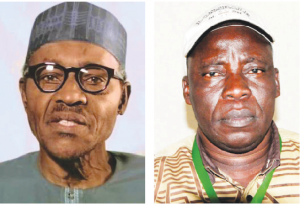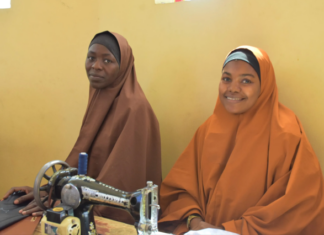Teachers, students, and the general public want more recognition of the teaching profession, writes Correspondent SAM NWOKORO.
When you ask any pupil to name the first primary school in Nigeria or the first head teacher of a primary school or principal of a secondary school, the response you are likely to get is a deafening mum.
Elsewhere, the answers to these questions are ingrained in the mind.
That in a nutshell explains the depth of apathy both society and the authorities have to teachers and the poor recognition they suffer in Nigeria.
A teacher here is about the most unappreciated social change agent in Africa’s biggest economy. The pupil forgets him as soon he passes out of primary and secondary schools.
These days one hardly hears about an alumni association of a primary or secondary school, except mainly older generation schools established in the colonial era.
Also, parents draw a blank on the teacher when they ought to remain grateful for his helping hand in the formative stage of their wards.
Teachers nudge parents to form associations for the goodness of schools and their wards. Yet parents/teachers’ associations (PTAs) do not care much for the interests of teachers.
Welfare, retraining
The government, with its distorted and acrimonious policies on education, hardly reckons with the welfare of teachers.
It sees them as the least important civil servants whose salary must run into arrears before they are paid. Most times politicians play embarrassing politics with their welfare.
Their work environment is about the worst compared to other professions: teaching aids are not available most times and teachers have to lobby or protest before school owners, government or private, provides half measures.
Salaries come late, mostly in arrears or after protests.
They teach 50 students or more per class, especially in government schools.
Nigerian teachers hardly have time for re-training and workshops, unlike other professionals in other sectors. Yet curriculum changes are dumped on them at short notice.
They have to press for their allowances and other perks of office endlessly, sometimes with the “intervention” of traditional rulers or eminent citizens, before the government would listen.
Sometimes, their pension is omitted from state fiscal budgets as if they are not part of the statutory workforce of the government.
In Enugu State, retired teachers recently wrote a petition to Governor Ifeanyi Ugwuanyi lamenting unpaid pensions dating back five years ago.
Shortages
All this discourages people from teaching. There is under staffing in most government schools where a teacher may handle forms three, four, and five in different subjects, thereby overworking him or her.
Under staffing caused such a problem in Ondo State that Governor Olusegun Mimiko converted about 900 council workers to teachers, regardless of whether they possess the qualification to teach.
Endangered primary education
World Teachers’ Day was marked on Monday, October 5.
UNESCO Director General for Education, Qiang Tang, used the occasion to warn that the scant regard for teachers in most African countries threatens the plan for maximum early child education by 2020.
The first phase of the Millennium Development Goals ended last September and the second phase, dubbed Sustainable Development Agenda, aims to end poverty worldwide by 2030.
UNESCO expressed concern that the poor attitude of political authorities in Africa to the teaching profession, especially in the production of quality teachers in sufficient numbers, may undermine most UN global agendas.
Said Tang: “The main challenge faced by the teaching profession today is both one of numbers and quality.
“With an estimated 1.7 million new teachers required to teach universal primary education by 2015, the recruiting of new teachers must go hand in hand with improving the quality of teaching and learning.
“Achieving quality education for all in line with Goal Number 6 of the UNESCO Dakar Framework on Child Education Curriculum 2014 calls for more and better trained teachers.
“Schools must be supported in attracting qualified teachers. The challenge must be met head on while ensuring quality and equity.
“Despite global recognition of the importance of teachers in changing children’s lives and building sustainable and prosperous societies, they are all too often undervalued and under empowered, particularly in the area of early childhood education (ECE).”
UNESCO says there is a growing shortage of quality teachers and inadequate professional training worldwide.
To achieve universal primary education by 2020, the UNESCO Institute of Statistics estimates that countries would need to recruit 10.9 million primary teachers.
It stressed that shortages of quality teachers in quantitative and equity measures results in equity gaps in access and learning which mostly affect the poorest regions and schools and the earliest grades.
“This is particularly damaging as there is clear evidence that the earliest years of child development are the most critical.”
The Nigerian teacher’s woes are compounded by the fact there is no authentic figure of the number of teachers on government pay roll.
Such statistics do not exist on the websites of the Nigerian Bureau of Statistics and the Nigerian Union of Teachers (NUT).
Private school teachers
Private school teachers are also subjected to the caprices of proprietors. Abuses include refusal to pay agreed salary scale.
“The proprietors normally cite low intake as the major reason,” said one teacher in a kindergarten, who gave her name simply as Mary.
“The pay depends on how many pupils we are able to recruit in a session. So our pay varies according to the number. Our madam too has to save some money in order to develop the school.”
This in a “government-approved” nursery and primary school with a creche class.
National Certificate of Education (NCE) holders in some private schools are paid as little as N25,000 per month.
Some private schools also lack modern teaching aids.
Other problems private school teachers face include uncertainty of tenure and promotion, getting fired without recourse to statutory protection, a lack of training and retraining, exposure to seminars, research grant and other empowerment courses.
Sociologists say “the work environment, especially teaching, does affect the output, in this case, quality of tutorial from a distraught teacher.”
Concern over education
The Mo Ibrahim Index on African Governance (IIAG) has warned Nigeria to pay serious attention to education above every other sector.
IIAG remarked in its 2015 survey of governance that Nigeria ranks 35th out of 54 countries in Africa on human development index.
It said although Nigeria has posted +3.4 change since 2011, it scored 44.9 out of 100 points in overall governance ranking in Africa, placing 39th.
“This score is lower than the African average (50.1) and lower than the regional average for West Africa (52.4).
“Since 2011, Nigeria has shown marginal over all governance improvement (+0.9) as the gains in three out of four categories namely: participation and human rights, sustainable economic opportunity and human development (education), safety and rule of law.
“The Nigerian government needs to redouble its commitment to education if the country is to meet the demands and challenges of the sustainable development goals agenda.
“And the Nigerian people believe there is no priority place to start than from the provision of trained and committed teachers especially at primary and secondary school levels.”
Teachers present a catalogue of demands
Teachers in Nigeria joined their counterparts around the world to mark World Teachers’ Day on Monday, October 5 and made several demands on the government, among them better conditions of service and teaching standards.
NUT President, Michael Alogba-Olukoya, said it is criminal for an employer not to pay employees, urging state governments to use the recent federal bailout funds to pay workers.
“Apart from the fact that non-payment of the monthly salaries to hardworking workers is a criminal offence, it is also inhuman for any employer of labour to deny workers their monthly wages,” he insisted.
He expressed concern over discrimination in the placement of terminal salary grade levels of graduate teachers in primary and secondary schools.
Similar sentiments and other problems were highlighted by NUT leaders in state capitals across the country.
Lagos
Lagos State Deputy Governor, Idiat Adebule, who represented Governor Akinwumi Ambode at the event at the University of Lagos (UNILAG), Akoka, pledged that the new administration will build on the legacies of its predecessors.
She noted that remuneration and career structure based on qualification places the terminal grade level of university graduates who teach in primary schools on Grade Level 17, the same set of graduates who teach in primary schools terminate on Grade Level 14 and their secondary school counterparts terminate on Grade Level 15 or 16 in many states.
State NUT Chairman, Raheem Adesegun, stressed the need to motivate teachers, compensate and empower them to deliver on their mandates. He also called for an upward review of the salary grade level of teachers.
His words: “Teachers are in the centre of the educational configuration but they are denied, deprived, and depressed.
“To redress the situation, teachers must attract a genuine professional status and be paid a special salary scale to address their social and financial short-change and disenfranchisement.”
Edo
State NUT Chairman, Mike Uhunmwangho, acknowledged in Benin City that the Edo State government has tried in revamping education that was in bad shape before now.
But he appealed that teachers be promoted, trained and retrained, and those transferred to other councils paid their salary arrears.
He also sought “resumption of regular payment of subventions, car and housing loans to teachers, pardon of principals who have been on suspension close to a year and the request for a parcel of land to build a new teachers’ house since the old one has been engulfed by flood.
“The NUT still strongly believes and insists that adequate and proper investment in the education sector, with particular emphasis on teachers, remains the best strategy to recover from the worsening financial and economic crisis facing the country at the moment.
“We must admonish our teachers to re-assess and re-dedicate themselves to the noble profession by discharging their duties with renewed vigour and a great sense of responsibility.”
Higher Education Commissioner, Washington Osifo, said the government is taking steps to end the problems in education, and “even the teachers are aware that the government of Edo State is friendly and understands their plight.”
Delta
Governor Ifeanyi Okowa stressed the need for the educational system to incorporate enterprise education, education for citizenship, financial education, collaborative online learning, and digital literacy.
He also wants the inclusion of emotional intelligence, interdisciplinary learning, critical thinking, effective communication, and learning beyond the classroom.
State House of Assembly Deputy Speaker, Friday Osanebi, reiterated that teachers play a critical role in nation building and should be encouraged.
“I want to thank my primary and secondary school teachers. Teachers’ roles in the fabric of a nation’s existence cannot be over emphasised; they determine our future through our children,” he said.
State NUJ Chairman, Jonathan Jemirieyigbe, expressed optimism that the celebration would cause state and councils to redefine the place of teachers by encouraging favourable working conditions and professional excellence to achieve required changes.
Akwa Ibom
State NUT Chairman, Etim Ukpong, urged the government to review the Universal Basic Education Board (SUBEB) Act and correct structural imbalances in the system.
He said in an address in Uyo that the review should also correct the anomaly where teachers on low salary grades are appointed as education secretaries above their senior colleagues in the classroom.
The NUT asked the state government to take over primary education and ensure teachers with qualification such as the National Certificate of Education (NCE), sandwich and Nigeria Teachers Institute (NIT) teach in primary schools.
Governor Udom Emmanuel’s Adviser on Bureau of Labour, Productivity and Manpower Planning, Ekpenyong Enyina, promised that the administration will cater for the welfare of teachers and work with their leaders.














